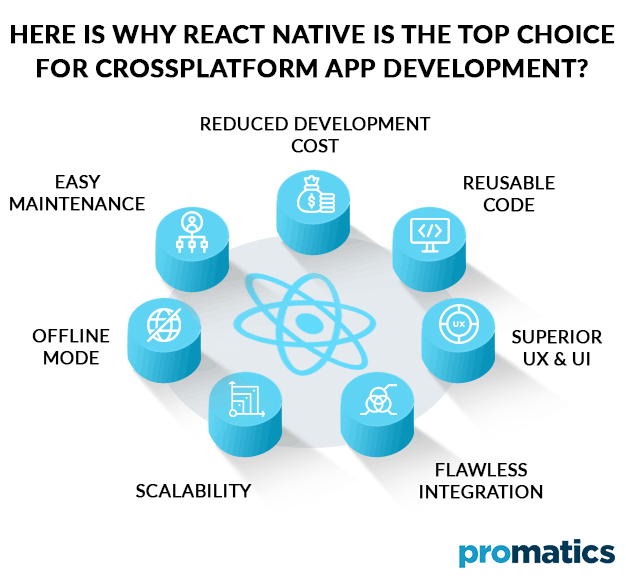Why React Native is your best bet when you want to develop apps on budget?
What stands in the way of a stellar business idea from turning into an overnight success is an app experience that does not bring out its gloss. That said, it isn’t easy to garner huge investments for your app business either. So, what’s an ambitious app start-up got to do? The scenario is a story with which many app businesses relate. This necessitates the need for a cost-efficient mobile app development process that can benefit mobile app startups.
Cross Platform Mobile App Development
As a business with limited resources, the choice between Android and iOS never came easy. While Android promised a wider outreach, iOS promised users with vivid purchasing power. Developing an app for both platforms meant double the time and cost of app development plus dual maintenance cost, with figures as despairing for startups as figures can be! In hindsight, it’s fair to claim that the programming world is marred by over-crowding of programming languages. As being a Jack of many; gets you to master none, developers strive to learn only a selection of few languages that guarantee that they get maximum exposure and client outreach. It also meant that the team of mobile app developers you hired need to be well versed at Java as well as Android SDK for Android development of your business app. However, the knowledge of Swift/Objective-C and Cocoa Touch became the pre-requisite for iOS development of the business app. Conclusively, it meant that a start-up was required to hire two teams of mobile app development experts with unique specializations to build apps for both platforms which can be economically intimidating for a business which is just starting out.
The times necessitated an app development solution that allowed prolific app development minus the huge costs associated with native app development. Cross Platform Mobile App Development is a procedure that allows app product development for multiple platforms through a singular round of coding. Developing cross-platform apps is fast and thus incurs less time and cost of development. Of all the native app development frameworks; React Native has earned a special place on the developer’s preference lists.
React Native: Cross-Platform App Development Framework
In 2015, Facebook launched React Native, a cross-platform app development technology that worked out better performing and looking apps which came with multi-device compatibility. React Native was welcomed as an open-source cross-platform app development framework that delivered final app products as good as native apps. It allows app developers to code in Javascript and develops apps for both Android and iOS. It is only fair to claim that react native is the best choice when it comes to programming languages. Here is why:
I. Reduced Development Cost
Cross-platform mobile application development omits the need for programming for individual platforms. React Native delivers high-quality mobile apps at a substantially lesser cost in a shorter duration. Not only does this leaves behind a hefty budget for marketing the app but also promises a longer duration to runt the marketing campaign.
II. Reusable Code
Coding is a complex procedure that is highly time-consuming and can incur significant expenses. Developing an app for multiple platforms requires separate coding for each platform. However, developing a cross-platform React Native app allows the same code to be reused, which in turn saves time and money.
III. Superior UX & UI
Cross-platform applications built through the React Native framework; come fully optimized and compatible with numerous devices. The framework translates the markup code to native, UI elements that power the mobile platform’s rendering views. Even if your application needs to run complex logic, the app UI runs smoothly around sixty frames per second. This ensures high performance without sacrificing capability. React Native cross-platform apps can display data way faster, adjust to the screen configurations in a swift manner and also never face fluctuating data streams. These apps also feature high definition app graphics and contents because of their lightweight nature.
IV. Flawless Integration
Cross-platform apps affect the internal functioning of phone devices. Thus, it reduces the amount of effort required for integration with the device when it comes to React Native cross-platform apps. These apps synchronize easily with default applications on a device like GPS, Camera etc.
V. Scalability
A cross-platform React Native app can be made available at multiple app stores such as Google’s play store or Apple’s AppStore. This is a plus point when it comes to ways to expand your reach and maximize your customer base. Since these apps can work flawlessly with different Operating systems and platforms with codes that can easily be reused, they become extremely simple to scale and develop.
VI. Easy Maintenance
A React Native cross-platform mobile application comes well equipped to make use of all the device applications, just like a Native app. While a Native app is harder to maintain for both a developer and a user because of their constant need for updates, cross-platform products like React Native apps can avoid versioning and are easy to maintain.
VII. Offline Mode
Ever wondered what makes a React Native Cross-platform app function as fast as a Native app, or sometimes even faster? The React Native apps store the mobile device’s API, resulting in the saving up of the app data offline. This results in a fast-working app, even in the areas that lack thriving network connectivity.
Why React Native is your Best Bet?
Choice of the operating system; design elements; development team, everything involved in the app development procedure incurs a cost. This is how each element is most cost-effective when you develop a cross-platform React Native app:
a.) It is very difficult and immensely time-consuming to update older versions of an Operating System in a Native app. However, in the case of Reach Native apps, versioning can be avoided which makes the maintenance of the app much easier as well as cost-effective.
b.) All developers agree that the programming required to support the dimensions and different orientation of various mobile phone devices is tedious. Additionally, to make a native app compatible with different versions of phone device incurs huge development costs. On the other hand, React Native cross-platform apps are very well compatible with different digital ecosystems and come optimized with a large number of phone devices. This saves when it comes to the overall cost.
c.) Maintenance costs include expenses like regular updates, troubleshooting and patching etc. These expenses double up for Native apps as they are developed for two platforms iOS and Android separately. React Native apps, on the other hand, can easily be maintained by a single app developer with a lesser cost.
d.) When working on a native mobile application, businesses shell out the high cost of designing UI/UX for individual platforms. However, a cross-platform React Native app runs with uniformity across all platforms.
e.) Various libraries like PhoneGap, Xamarin, etc. are used by developers working on React Native applications. This makes the development process shorter, reducing the cost of development considerably.
Conclusion
React Native is a Javascript framework for writing natively rendering, real, mobile applications for IOS and Android. It allows you to build mobile apps using only JavaScriptlets. This results in an engaging mobile UI that is built using declarative components. React Native allows cross-platform native app development. This means that the code written for one platform is used on another platforms as well, thus economizing the whole app development project. Some of the most popular business apps of our times like Facebook, Instagram, UberEats, Walmart, Airbnb, Wix, Skype, Pinterest, Bloomberg, Tesla, all use the React Native Framework. In fact we at Promatics Technologies have been delivering mobile apps based on React Native to many entrepreneurs and startups and have seen fantastic results. It is evident that React Native framework has already occupied a substantial portion of the mobile app market globally, with perks like cost-effectiveness and ease of deployment. Cross platform app development is rising and React Native is at the fore front of it. With the growth in the popularity of React Native platform and constant improvement introduced by Facebook, the framework is set to be a clear winner in the near future.
If any cross platform technology is standing up to native platforms then it is the React Native framework. It gives you a solid app with much lesser investment and you can hit the road running instead of scouting for investors.
Still have your concerns?
Your concerns are legit, and we know how to deal with them. Hook us up for a discussion, no strings attached, and we will show how we can add value to your operations!

